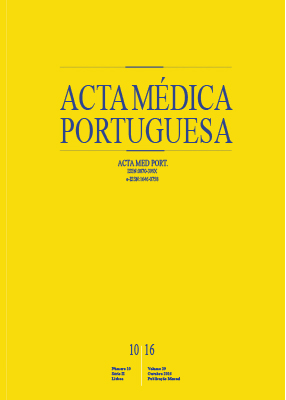Low Adherence to Mediterranean Diet in Portugal: Pregnant Women Nutrition in Portugal and its Repercussions
DOI:
https://doi.org/10.20344/amp.7344Keywords:
Diet, Mediterranean, Patient Compliance, Portugal, Pregnancy, Pregnant Women.Abstract
Introduction: Portuguese population is drifting away from the Mediterranean diet-like pattern. In this context, the current nutritional
status of women of childbearing age and of pregnant Portuguese women and their growing fetuses is critically reviewed.
Material and Methods: A narrative critical review was performed on recent published high quality studies assessing diet and nutritional status of women of childbearing age and pregnant women and its influence on the nutritional status of their offspring.
Results: Data from five multinational ecological studies that included Portugal, two national official surveys on food availability, seven national studies on the diet and nutritional status of women of childbearing age and pregnant women, and five national studies on the effect of nutritional maternal factors on their growing fetuses were selected and analyzed. The prevalence of overweight/obesity has dramatically increased in Portuguese women of childbearing age and pregnant women, associated with the described trend of low adherence to Mediterranean diet. Variations in energy and macronutrients intakes during pregnancy seem to have no significantly impact on the nutritional status of growing fetuses. On contrary, pre-pregnancy overweight/obesity has been associated with increased offspring adiposity at birth, and an excessive gestational weight gain may be associated with offspring’s overweight status in childhood. Factors potentially contributing to low adherence to the Mediterranean diet, deserving further investigation, include European Union agriculture policies that have implemented the production of non-Mediterranean food groups at low cost, and insufficient financial capacity to afford foods of quality reported by Portuguese population.
Conclusion: Retrieving traditional Mediterranean dietary habits should be incorporated into strategies for prevention and treatment of
overweight/obesity in Portugal, especially in women of childbearing age.
Downloads
Downloads
Published
How to Cite
Issue
Section
License
All the articles published in the AMP are open access and comply with the requirements of funding agencies or academic institutions. The AMP is governed by the terms of the Creative Commons ‘Attribution – Non-Commercial Use - (CC-BY-NC)’ license, regarding the use by third parties.
It is the author’s responsibility to obtain approval for the reproduction of figures, tables, etc. from other publications.
Upon acceptance of an article for publication, the authors will be asked to complete the ICMJE “Copyright Liability and Copyright Sharing Statement “(http://www.actamedicaportuguesa.com/info/AMP-NormasPublicacao.pdf) and the “Declaration of Potential Conflicts of Interest” (http:// www.icmje.org/conflicts-of-interest). An e-mail will be sent to the corresponding author to acknowledge receipt of the manuscript.
After publication, the authors are authorised to make their articles available in repositories of their institutions of origin, as long as they always mention where they were published and according to the Creative Commons license.









